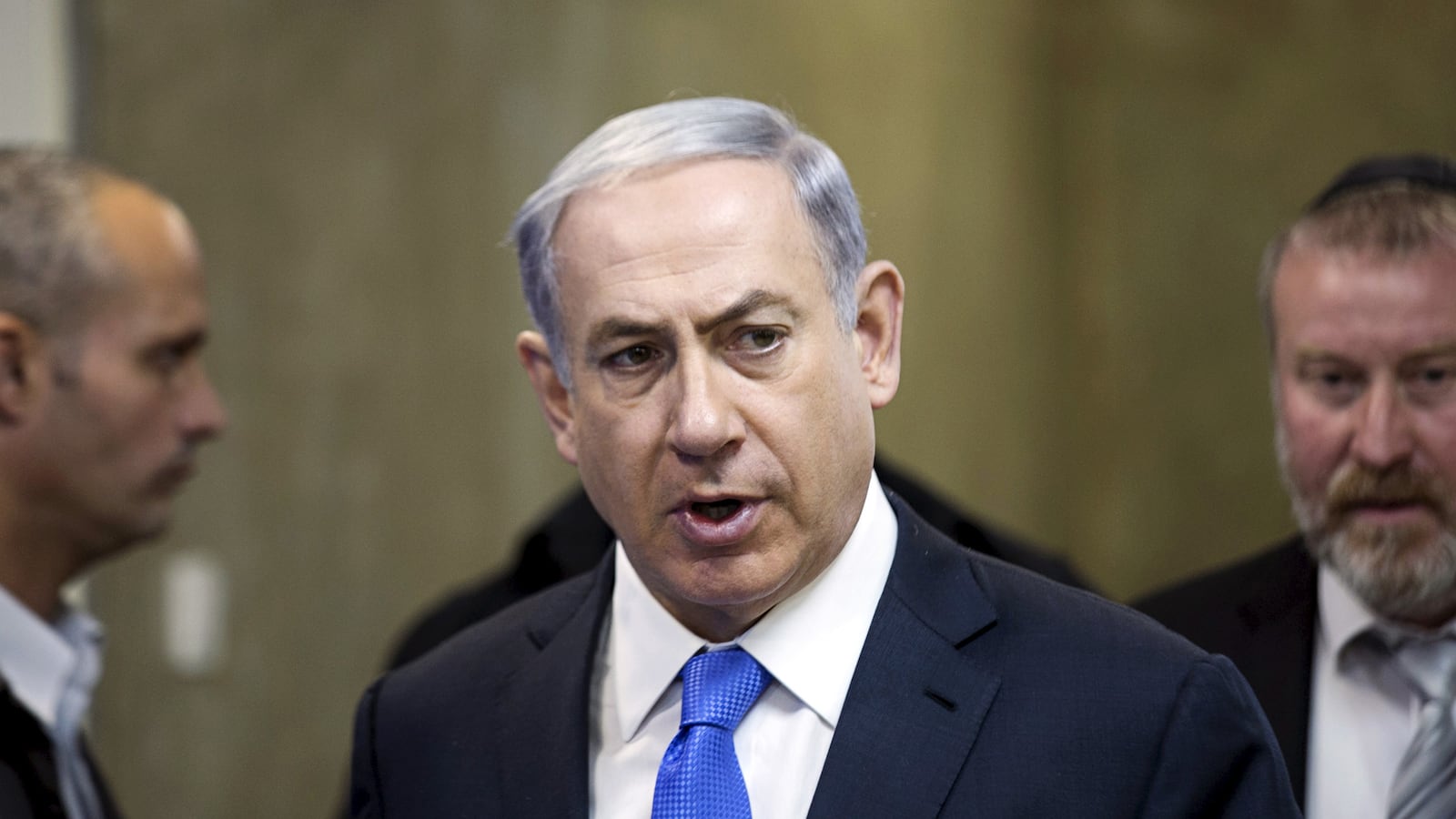Israeli Prime Minister Benjamin Netanyahu believes the Iran nuclear deal is a “stunning historical mistake.” Meanwhile, Israel’s opposition Labor Party, Republicans here at home, and much of the American Jewish community are joining him in denouncing the agreement signed last week.
But many former senior intelligence and national security officials in Israel disagree. While they think the deal is flawed and that Netanyahu deserves credit for raising the alarm on Iran years ago, they also believe that the historic agreement is—on balance—in the national security interest of the State of Israel.
I spoke recently with Ami Ayalon, a former head of Shin Bet, the Israeli internal security service, and a former chief of the Israeli Navy. Even as he explained that the issue “is not black and white,” he reeled off a list of former defense ministers and chiefs of Shin Bet and Mossad who agree with him that “when it comes to Iran's nuclear capability, this [deal] is the best option.”
“When negotiations began, Iran was two months away from acquiring enough material for a [nuclear] bomb. Now it will be 12 months,” Ayalon says, and the difference is significant to anyone with a background in intelligence. “Israelis are failing to distinguish between reducing Iran’s nuclear capability and Iran being the biggest devil in the Middle East,” he says.
Why has the response been more emotional than logical? “It’s very easy to play with fears in a fearful society,” he says.
For a country that usually has a sure sense of its own security interests, Israel can be strangely obtuse about the true existential threats it faces. Many Israelis and American Jews resent Jimmy Carter for his strong views opposing the occupation of Palestinian territories and his use of the word “apartheid” to describe the situation there. They rarely recognize that by engineering the Camp David Accords, Carter removed the existential threat posed by the Egyptian army, the only force capable of driving Israel into the sea.
Now they dislike President Obama for striking a deal that, at a minimum, delays Iran’s ability to destroy Israel with a nuclear bomb.
Ayalon and several of the other Israeli war heroes who appeared in The Gatekeepers, an acclaimed 2012 documentary about Shin Bet, endorse Obama’s best argument for the agreement—that the alternative is much worse.
Just imagine what would happen if Congress overrides Obama’s veto and kills the deal. No one seriously disputes that the sanctions regime would quickly collapse; Russia is already planning its new business deals with Iran and the Europeans aren’t far behind. The idea that a tougher United States could by itself force better terms is a dangerous fantasy. With rejection, we would get the worst of both worlds. Iran would have much of its oil money back, but without the most intrusive inspections in history (24/7 monitoring of its nuclear facilities), 98 percent reductions in uranium stockpiles, and the many other provisions that sharply reduce its existential threat to Israel.
At that point, Iran--freed of an international coalition arrayed against it, and led by Tehran hard-liners empowered by the American decision--would have no reason not to race to a bomb.
Then we would risk a war full of unintended consequences that would be blamed by the world on the U.S. Congress buckling to Israeli pressure. And it wouldn't go well. Ayalon cites Israeli intelligence estimates that U.S. bunker-buster bombs would at best set back Iran’s nuclear program by two to four years, or roughly a fifth as long as required by the terms of the new deal. And that’s assuming a war-weary United States would even fight.
But even with a deal, the U.S. needs to make it seem as if we would. Ayalon and his colleagues believe the best way for Obama to reassure Israel and help sell the agreement at home is to ramp up his rhetoric. They fault him for not spelling out more serious consequences for when (not if) Iran cheats, and for when the deal expires. Obama “doesn't have the right combination of the language of peace and the language of war,” Ayalon told me. “He has to make it very clear that while he believes in diplomacy, he also knows how to use force.”
Sound advice. Before long, the president should assert that violations of the agreement would bring not just “snap-back” sanctions but military action. In his weekly radio address on Saturday, he said that despite the deal expiring in 10 to 15 years, U.S. policy preventing Iran from acquiring a nuclear weapon is “permanent.” That’s a start.
In the meantime, the superiority of diplomacy to war may be best understood in the case of the Arak heavy water reactor, which produces the deadly plutonium most easily used to build nuclear weapons. Under the deal, Arak’s plutonium threat is ended, an achievement that has been strangely downplayed this week. At the same time, the huge underground nuclear installation at Fordow will be much more effectively neutered by a corps of IAEA inspectors with unfettered access than by bombs that might have trouble penetrating the solid rock above it.
Netanyahu’s arguments against the deal, meanwhile, are getting pathetic. Last week, he latched onto the 24 days Iran can delay before allowing inspectors into its ostensibly non-nuclear military facilities. This is like giving a drug dealer 24 days to get rid of his stash, the prime minister said. Iran could just “flush the meth down the toilet.”
What a perfect example of the level of debate in the U.S. and Israel, where a catchy sound bite substitutes for basic science and common sense. With the half-life of uranium-235 at 703.8 million years, 24 days is a nanosecond. Soil samples gathered by inspectors would quickly identify the presence of fissile material. As Obama drily pointed out, “This is not something you hide in a closet, put on a dolly and move somewhere.”
Obama was right to be annoyed that Netanyahu and so many Israeli and American critics denounced the agreement before reading it. Compare that to 1978, when Jimmy Carter signed a hugely unpopular treaty turning over the Panama Canal to the Panamanians. Carter’s White House privately asked all 100 senators to pledge to hold their fire until they were briefed on the details by the State Department. Ninety-nine of them (everyone except Jesse Helms) agreed. That was when the Senate actually was a “deliberative body” instead of a television studio.
As the balance of power in the Middle East shifts more toward Iran, Obama is making it clear that Israel, Saudi Arabia, and the Gulf states will all get “unprecedented” security assurances from the U.S. (He has already provided record amounts of military aid to Israel, which Israelis and some American Jews rarely credit.)
More important, Obama has in recent days repeatedly mentioned troublesome Iranian arms shipments and support for terrorist organizations. Until now, Iranian proxy wars have been a third-tier presidential issue. Now they will move to the top of Washington’s foreign policy agenda, with Republicans frustrated by the nuclear deal likely to pound away on these threats to Israel’s security, thereby helping Israel confront them over time.
Ayalon and other Israeli intelligence experts believe it’s inevitable that Iran will test Obama or his successor’s resolve, likely by dragging its feet with the help of the complex dispute resolution process spelled out in the appendix of the deal.
By my reading of the appendix, the weakest sections involve the specifics of how the newly created Joint Commission will litigate claims. While majority rule on the Commission means that the U.S. and its European allies don't need Russia and China to enforce inspections, the complicated appeals system that includes vague “advisory groups” is a feast for Iranian lawyers.
Obama must avoid the situation President Clinton faced in the 1990s, when North Korea cheated gradually on a nuclear deal and built a bomb without significant impediments. He’ll need to identify and publicize every Iranian delay or lack of cooperation and spell out the consequences.
On Iran’s regional misbehavior, Obama should now pivot to a much tougher policy of interdicting Iranian arms shipments, which would enhance Israel’s security even if Tehran now has lots more money for mischief. An international peace conference on the future of Syria proposed by Russian President Putin—now being considered by the U.S.—would offer another chance for checking Iran, which is the primary backer of Bashir Assad’s murderous regime. Any future cooperation with Iran on battling ISIS, which is inching closer to the Jewish State’s borders, is also in Israel’s interest.
For six years, Barack Obama has been cautious about calling out Iran. To convince China and Russia not to veto sanctions in the Security Council, he spoke softly. Harsh condemnations might have complicated the nuclear deal, which was rightly his first priority. The same went for pushing too hard on Iran’s outrageous imprisonment of four innocent Americans.
Now the president will have a much freer hand to confront Iran on its non-nuclear behavior, and has more political incentive to do so. Like the deal itself, that’s good for the world in general, and Israel in particular.






